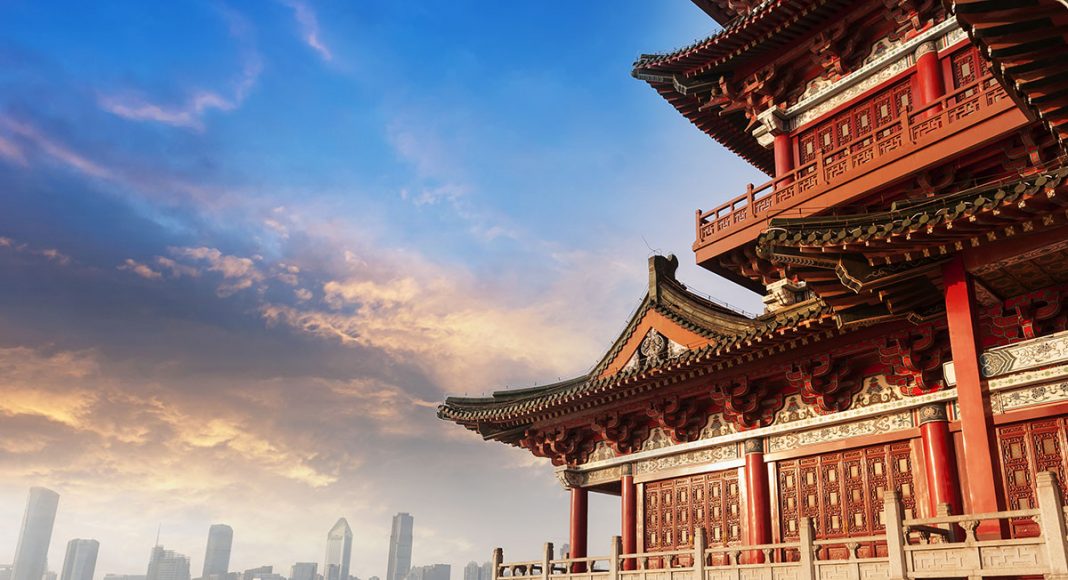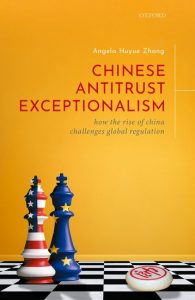In an interview with ProMarket, Angela Huyue Zhang, author of a new book Chinese Antitrust Exceptionalism, discusses the motivations behind the recent antitrust investigations into Chinese-based companies, and her predictions for the future of Chinese antitrust enforcement.
It’s not just US Big Tech firms who are currently facing antitrust scrutiny on their home front. Chinese-based companies such as Alibaba, Tencent, and Baidu were recently subject to antitrust investigations and fined by China’s antitrust regulator for past acquisitions and investments. According to Chinese law expert Angela Huyue Zhang, these recent crackdowns on Big Tech in China is Chinese Antitrust 2.0.
“Antitrust first originated as policies designed to correct market failures in Western democracies, but in the hands of the Chinese government, antitrust has become a multi-functional regulatory tool,” Zhang writes in her new book, Chinese Antitrust Exceptionalism. According to her, antitrust enforcement has been used by the Chinese government to not just rein in Big Tech, but also to influence trade policy and as an economic weapon.
Zhang, who studied under Judge Richard Posner at the University of Chicago Law School, says she was heavily influenced by his pragmatic way of thinking and wrote her book without any preconceptions, analyzing the developments in Chinese antitrust law and enforcement in the broader context of China’s global economic presence.
“China resembles that new kid on the playground: not only has it developed as a new antitrust regulator but also as a foreign target for antitrust regulation. In recent years, Chinese companies’ ambitious forays into Western markets have created unease among Western regulators, making them question whether their existing regulatory framework is enough to deal with Chinese firms,” she writes in the earlier chapters.
To learn more about China’s approach to antitrust, ProMarket spoke with Zhang about her book, the motivations behind the recent antitrust investigations, and her predictions for future of Chinese antitrust enforcement.
[The following conversation has been edited for length and clarity.]
Q: In your book, you write that when companies are investigated [for antitrust violations] in China, they tend to just settle and they don’t go to court.
Yes, and this is due to power imbalances between the government and the companies. Many successful companies in China operate in legal gray areas, which makes them vulnerable to regulatory attack. This is either because the law is vague, ambiguous, or not up-to-date, or because enforcement is simply not up to the standard you would expect in a mature jurisdiction. Sometimes these companies are at fault themselves, because they didn’t really comply with the laws in the first place. Legal ambiguities give Chinese government agencies a lot of room to find wrongdoing in companies. So when the government tries to rein companies in, they don’t dare resist, because they anticipate that the government will just punish them more if they put up a fight. To see what happens when you oppose the government, just look at China’s fintech giant Ant Group: Jack Ma made a controversial speech in Shanghai last October criticizing the regulators, which quickly triggered a regulatory crackdown on Ant and the rest of Ma’s business empire.
Jack Ma is an outlier. Most business leaders in China think: “Because I have to deal with the government repeatedly, I better just do what the government asks me to do.” Few would challenge the government. It’s not that these companies cannot win their cases in court; the regulators are actually worried about being challenged in court, because that makes them look bad. It’s more that these companies are aware of the huge potential costs associated with challenging China’s government agencies.
My book also talks about reputation sanctions, a strategy where state agencies strategically leverage state media to inflict reputational damage on companies. The media is an extremely powerful weapon in China, because all media outlets are controlled by the government. And many Chinese people do trust what they learn from the media. So the government can strategically leak negative news about that firm to state media, which can have very dire consequences for the firm’s stock price.
Again, just look at China’s antitrust investigation into Alibaba, a very recent example. When a Chinese government agency announced its investigation into Alibaba on Christmas Eve last year, it wiped out over $100 billion of Alibaba’s market capitalization. You see the antitrust agency hasn’t made any penalty decision, but the mere announcement of an investigation already sent a very bad signal to the market. That’s why companies would rather just cede to the agency’s demand, pay their fines, and move on with their lives.
Q: You make a distinction between how foreign and domestic companies are treated. Can you explain where that comes from?
I don’t think Chinese government agencies specifically discriminate against foreign companies or try to put them in a disadvantaged position. The reality is that when Chinese agencies conduct investigations, they tend to be met with less resistance from foreign companies than large and powerful state-owned firms. Even though the Chinese antitrust agency is seldom challenged in court, it does face bureaucratic constraints. Because the antitrust agency is a very small bureau nested within a very large central ministry, it’s quite hard for the agency to tackle large state-owned firms because of bureaucratic resistance, not only from the firms themselves, but also from other regulators, like the sector regulator, or even the state assets regulator. But when the antitrust authority goes after a foreign company, even powerful companies like Qualcomm who can lobby the US president, there’s much less resistance from within the Chinese bureaucracy. So if you compare a central state-owned firm with a foreign company, I would say that the Chinese authorities have a much easier time dealing with the foreign company.
That said, there are other variables at play. Whenever the US-China relationship is very tense, I think the Chinese antitrust agency thinks twice before launching any big case against large American companies for fear of angering corporate America, which might trigger further sanctions from the United States. So they do have a lot to think about when they go after foreign companies. But, again, I don’t think they specifically want to target foreign companies. They just find it much easier to bring cases against them.
“Whenever the US-China relationship is very tense, I think the Chinese antitrust agency thinks twice before launching any big case against large American companies for fear of angering corporate America, which might trigger further sanctions from the United States.”
Q: A lot of the antitrust coverage of what’s happening in China is framed as China’s stepping up antitrust to compete with the US, or as China’s stepping up antitrust to rein in its own Big Tech companies. Do you think that’s accurate framing or is there’s more at play?
I recently wrote an op-ed about how China is stepping up its antitrust regulation so that its firms are more competitive against tech rivals in the United States. This is something that I didn’t cover in my book, because Chinese antitrust was actually been fairly quiet between 2015 and 2020. And all of a sudden, since November last year, there has been a kind of a resurgence of interest, because of the crackdown on Big Tech in China. I call this Chinese antitrust 2.0.
If you look at what’s happening in the US or the EU, regulators are trying very hard to bring Big Tech to their heels. But the existing jurisprudence in the US makes it very hard for regulators to win any case in court, and legislative changes will take years. So, Big Tech in the US has lot of leverage against the government. By contrast, Chinese Big Tech companies have much less leverage and quickly bow to government demands. That is why, at the moment, the government has a huge incentive to push Chinese tech companies towards innovation in foundational science and technology. These areas form China’s bottleneck in its tech rivalry with the United States. Think about what is happening with Huawei and ZTE, whose business operations were disrupted as soon as the United States suspended its supply of semiconductors. The Chinese government is acutely aware of the country’s weaknesses.
On the other hand, China is truly the only country other than the United States that can foster Big Tech. And we have these tech giants that are already very cash rich, employ great talents, and run very sophisticated software development. So it’s very natural for the government to want to count on these companies, because they have the resources and the manpower to help China achieve self-sufficiency. So in this way, this power imbalance between the government and tech firms—supposedly a weakness in Chinese institutional design—can actually be a competitive advantage for the Chinese government, because it can get the firms to do what it wants. Whereas if you look at the US and the EU, they’re still struggling. “What do I want to do with my superstar companies?” There’s no consensus. It’s unclear where they’re headed, and it might take many years before anything happens. Whereas in China, things can happen very quickly.
Q: Where do you see Chinese antitrust going forward?
There are many positive signs with the new antitrust agency, the State Market Regulatory Commission. This goes back to institutional incentives. The officials working there want to professionalize their work, because in order to be regarded as antitrust experts, it’s important that they do things professionally. The agency is improving its efficiency, while also trying to inject more transparency into its enforcement processes. These are all very positive developments. And now, Beijing’s very clear signal to rein in Big Tech is giving the agency a big boost. Perhaps this will get them more resources, because the agency is very resource-restrained right now. Then they might be able to play a more prominent role in future economic regulation.
“Beijing’s very clear signal to rein in Big Tech is giving the agency a big boost.”
The Chinese government views antitrust as a multi-purpose tool to do a lot of things: not just to tackle monopolies, but also to control inflation and ensure price stability, as a countermeasure against US sanctions. And now antitrust is becoming an industrial policy tool to nudge Chinese Big Tech firms towards innovations that will help China achieve technological self-sufficiency.
Q: Were you surprised by anything that you found out while you were researching your book or writing your book?
I was surprised that some companies that were subject to Chinese antitrust investigations were actually happy to be fined. That’s pretty counterintuitive, isn’t it? I mean, in other parts of the world, companies try to fight their cases and delay penalties, but not in China! In a number of cases when fines were imposed, you actually see the market rebound. This is why company executives were saying, we wish government agencies would release their decisions sooner, because that would remove all these potential repercussions to our stock prices.
Q: Anything that you wish I had asked you about, or that you wish we had covered that we didn’t get to talk about yet?
Obviously, my book was written for a Western audience. And I try to explain what’s happening in China in a very neutral and balanced way because there are many misconceptions about China these days. I am sure people who read this book will have their own preconceptions of what is right or wrong. But I do want my readers to understand what’s happening in China with a more open view, because China has a completely different system from the West. This will help them understand the sources of tension between China and the United States. They will find that none of these tensions are ideological, but institutional. And I do hope my book can inspire readers to find some solutions and ideas as to how the United States can potentially engage with China in the future.







